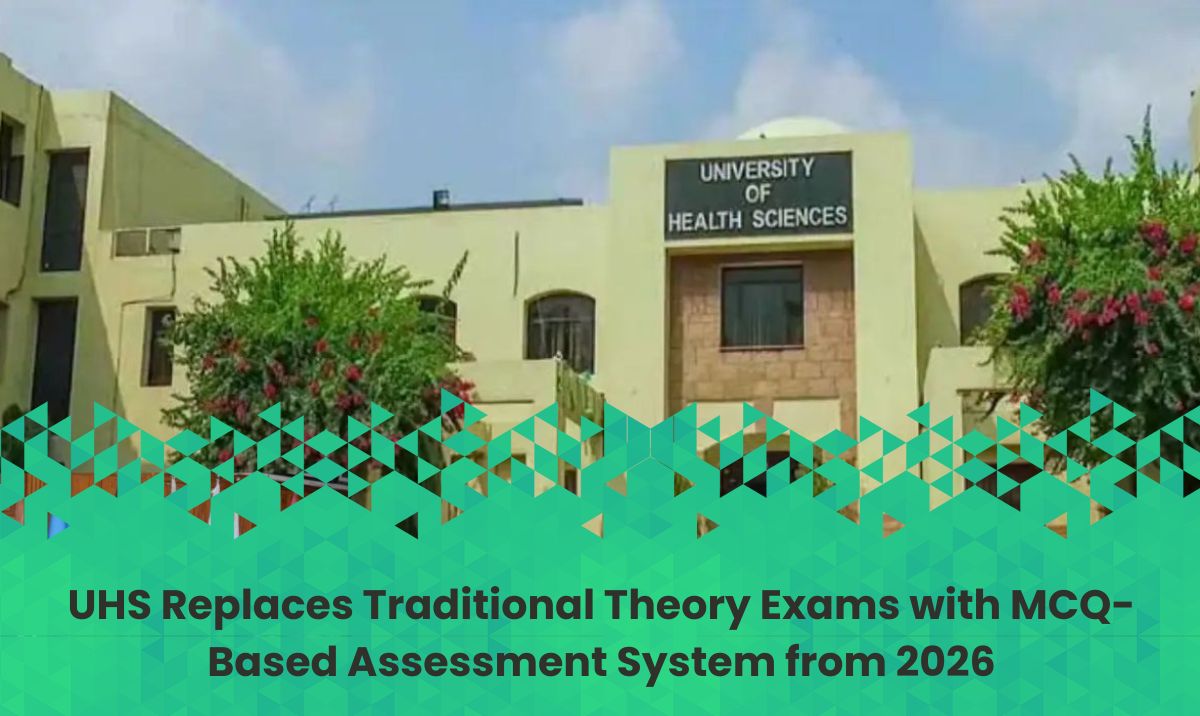
The University of Health Sciences (UHS) Lahore has announced a major overhaul of its examination system, introducing a fully multiple-choice question (MCQ)-based assessment format from 2026. This landmark decision, approved during the 40th meeting of the UHS Academic Council chaired by Vice Chancellor Prof. Dr. Ahsan Waheed Rathore, marks one of the most significant reforms in medical education in Pakistan’s history.
The new policy eliminates traditional short essay questions (SEQs) in all professional examinations, including MBBS, BDS, Nursing, and postgraduate programs. Under the revamped system, students will be assessed entirely through structured, standardized, and objective testing methods.
The decision aligns UHS with international medical education standards, focusing on fairness, transparency, and uniformity in student evaluations.
End of Essay-Based Exams at UHS
Starting from the academic year 2026, theory exams for all undergraduate and postgraduate programs will consist exclusively of MCQs, while SEQs and long questions will be completely discontinued. This transition represents a major shift from traditional testing methods that often relied on subjective marking and essay-based assessments.
Prof. Dr. Ahsan Waheed Rathore explained that the decision was taken to promote a more reliable and evidence-based evaluation system.
“Traditional essay-based exams lacked objectivity and consistency. Our new MCQ-only system ensures transparent, standardized, and data-driven assessments, allowing timely results and fair evaluation for thousands of students,” he said.
“The ultimate goal is to produce competent, ethical, and globally competitive healthcare professionals.”
Under the revised policy, students must score at least 65% separately in theory and practical exams to pass. Internal assessments will continue to carry 20% weightage toward final grading.
Pilot Implementation in 2025 Nursing Exams
Before the full rollout in 2026, UHS will pilot the MCQ-only exam format in Nursing programs during 2025. This pilot phase will allow the university to evaluate and refine the process, ensuring smooth implementation across all disciplines the following year.
The pilot will also serve as a model for affiliated medical and dental colleges, helping them prepare faculty and students for the transition. According to university officials, the move is part of a broader plan to modernize medical education assessment in Punjab and align it with the World Federation for Medical Education (WFME) and Pakistan Medical and Dental Council (PMDC) standards.
OSPE and OSCE Formats for Practical Exams
While theory exams will now be MCQ-based, practical and clinical evaluations will adopt Objective Structured Practical Examinations (OSPE) and Objective Structured Clinical Examinations (OSCE) formats.
These internationally recognized assessment methods evaluate students’ practical competencies through structured stations and standardized checklists, minimizing examiner bias.
According to UHS officials, this dual approach—MCQs for theory and OSPE/OSCE for practicals—will ensure that both knowledge and skills are tested fairly and consistently.
Read More : University of Health Sciences Lahore Admissions 2025
Quality Assurance Framework for Fair Assessment
The UHS Academic Council also approved a Quality Assurance Framework to maintain the integrity and effectiveness of the new system. The framework includes:
-
Examiner Training: Faculty members will receive specialized training in question writing, assessment design, and evaluation techniques.
-
Question Blueprinting: Exams will follow a defined structure to ensure balanced coverage of all course topics.
-
Post-Exam Moderation: Results will undergo rigorous moderation to identify anomalies or inconsistencies.
-
Data-Driven Analysis: Statistical tools will be used to evaluate exam reliability and identify areas for improvement.
These measures aim to create a robust, transparent, and student-friendly examination process.
Support and Endorsement from Affiliated Colleges
The reform was discussed extensively with principals, deans, and senior faculty members from UHS-affiliated medical and dental colleges before its approval. Participants of the council meeting unanimously endorsed the policy, recognizing it as a step toward modernization and academic excellence.
Many educators believe that replacing SEQs with MCQs will eliminate examiner bias, reduce marking delays, and make results more comparable across institutions. The structured nature of MCQs also helps test a wider range of topics, ensuring comprehensive evaluation of students’ understanding.
A Step Toward Global Standards in Medical Education
UHS’s decision reflects a growing international trend toward competency-based education in the health sciences. Many leading universities and accreditation bodies now emphasize objective testing, data analytics, and continuous feedback over traditional essay-based evaluations.
Prof. Rathore stated that the reform aligns with global medical education best practices.
“This policy was developed after months of consultation with academic experts and stakeholders. It represents a collective consensus to bring UHS in line with WFME and PMDC recommendations. Our goal is not just reform, but transformation,” he said.
The Vice Chancellor further highlighted that modern assessment systems are vital for developing professionals capable of meeting the evolving healthcare needs of society. “By introducing standardized, evidence-based testing, UHS is preparing students for the global medical landscape,” he added.
Impact on Medical Education in Pakistan
The implementation of this policy is expected to influence other medical universities in Pakistan to adopt similar approaches. As the country moves toward international accreditation standards, assessment reform will be critical in ensuring the credibility of medical degrees worldwide.
Experts predict that the new system will encourage students to focus on conceptual understanding and critical thinking rather than rote memorization. The structured MCQ format will test knowledge depth, clinical reasoning, and application of concepts—all essential qualities for modern healthcare professionals.
The University of Health Sciences’ bold move to replace traditional theory exams with an MCQ-only format marks a turning point in Pakistan’s medical education system. By prioritizing fairness, objectivity, and international alignment, UHS is paving the way for a new era of academic excellence.
With pilot programs starting in 2025 and full implementation expected by 2026, UHS stands poised to lead the modernization of health sciences assessment in Pakistan—ensuring that future doctors, nurses, and allied health professionals are tested, trained, and trusted to serve both locally and globally.


.jpg)
 (1).jpg)












